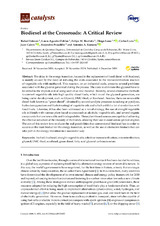Biodiesel at the Crossroads: A Critical Review
Autor
Estévez, R.
Aguado-Deblas, Laura
Bautista, Felipa M.
Luna, Diego
Luna, Carlos
Calero, Juan
Posadillo, Alejandro
Romero, Antonio A.
Editor
MDPIFecha
2019Materia
BiofuelBiodiesel
Straight vegetable oils
Selective transesterification
Interesterification
Gliperol
DMC-Biod
Ecodiesel
Green diesel
Fatty acid glycerol carbonate esters
METS:
Mostrar el registro METSPREMIS:
Mostrar el registro PREMISMetadatos
Mostrar el registro completo del ítemResumen
The delay in the energy transition, focused in the replacement of fossil diesel with biodiesel, is mainly caused by the need of reducing the costs associated to the transesterification reaction of vegetable oils with methanol. This reaction, on an industrial scale, presents several problems associated with the glycerol generated during the process. The costs to eliminate this glycerol have to be added to the implicit cost of using seed oil as raw material. Recently, several alternative methods to convert vegetable oils into high quality diesel fuels, which avoid the glycerol generation, are being under development, such as Gliperol, DMC-Biod, or Ecodiesel. Besides, there are renewable diesel fuels known as “green diesel”, obtained by several catalytic processes (cracking or pyrolysis, hydrodeoxygenation and hydrotreating) of vegetable oils and which exhibit a lot of similarities with fossil fuels. Likewise, it has also been addressed as a novel strategy, the use of straight vegetable oils in blends with various plant-based sources such as alcohols, vegetable oils, and several organic compounds that are renewable and biodegradable. These plant-based sources are capable of achieving the effective reduction of the viscosity of the blends, allowing their use in combustion ignition engines. The aim of this review is to evaluate the real possibilities that conventional biodiesel has in order to success as the main biofuel for the energy transition, as well as the use of alternative biofuels that can take part in the energy transition in a successful way.

